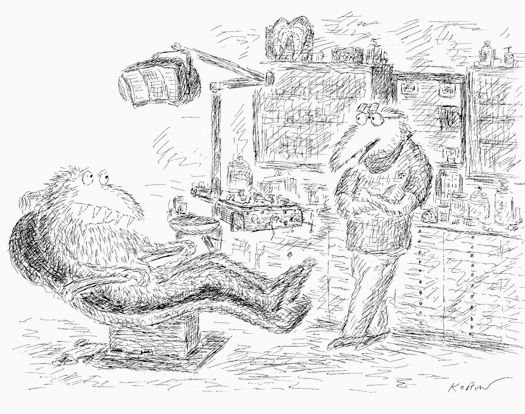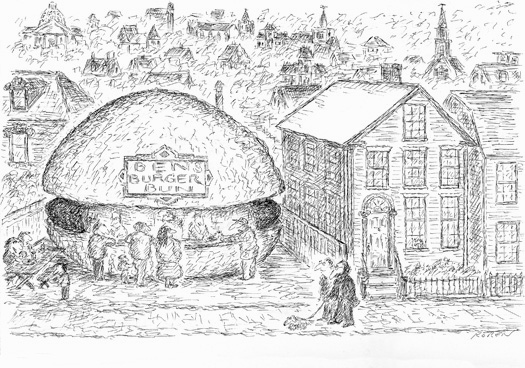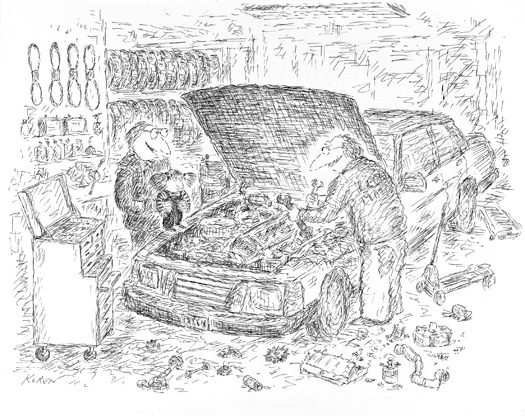
"I detect a little laxity in your flossing," 1991. All artwork courtesy the Wallach Art Gallery and the artist
The expat life has its charms, but the downside is an endless longing for things not obtainable in the exotic land you inhabit. I’m talking here about M&Ms and peanut butter and the lengths to which one goes to find such American delicacies. In Budapest, where I lived in the late ’80s and early ’90s, that meant forking over $25 a week for an air-freighted copy of the Sunday New York Times more for the feel and the look of it than the content. And in London, where I lived after Hungary, it meant feasting on Edward Koren cartoons in my imported New Yorkers, which were as satisfying as corned beef sandwiches from Selfridge’s department store. Those whimsical, curly-haired folks with pointed noses and befuddled expressions — all rendered in Koren’s squiggly lines — spoke of home. Not exactly where I grew up on Long Island, but the world I knew about and aspired to, the Upper West Side, a neighborhood, as The New York Times put it recently in its review of a Koren retrospective, of “overeducated, comfortable but not superrich liberals and the psychotherapists who treat their garden-variety neuroses.”
The exhibition, “Edward Koren: The Capricious Line,” took place at an appropriate venue: the Miriam and Ira D. Wallach Art Gallery at Columbia University, in the heart of the Upper West Side’s intellectual universe. (The show closed on June 12 but a lavishly illustrated catalog has just been published by the Wallach Art Gallery.) Koren, Columbia ’57, fits right in with his characters and their eternal quest to understand any number of perplexities: urban life, dentists, bicycles, machines, art and artists, and how city dwellers deal with the weirdness of the countryside at their weekend homes. It’s a world of fantasy “based firmly in reality,” notes David Rosand, in an exhibition essay, and one that is not only “psychologically acute” but also philosophically provocative, as the Times pointed out.
The expat life has its charms, but the downside is an endless longing for things not obtainable in the exotic land you inhabit. I’m talking here about M&Ms and peanut butter and the lengths to which one goes to find such American delicacies. In Budapest, where I lived in the late ’80s and early ’90s, that meant forking over $25 a week for an air-freighted copy of the Sunday New York Times more for the feel and the look of it than the content. And in London, where I lived after Hungary, it meant feasting on Edward Koren cartoons in my imported New Yorkers, which were as satisfying as corned beef sandwiches from Selfridge’s department store. Those whimsical, curly-haired folks with pointed noses and befuddled expressions — all rendered in Koren’s squiggly lines — spoke of home. Not exactly where I grew up on Long Island, but the world I knew about and aspired to, the Upper West Side, a neighborhood, as The New York Times put it recently in its review of a Koren retrospective, of “overeducated, comfortable but not superrich liberals and the psychotherapists who treat their garden-variety neuroses.”
The exhibition, “Edward Koren: The Capricious Line,” took place at an appropriate venue: the Miriam and Ira D. Wallach Art Gallery at Columbia University, in the heart of the Upper West Side’s intellectual universe. (The show closed on June 12 but a lavishly illustrated catalog has just been published by the Wallach Art Gallery.) Koren, Columbia ’57, fits right in with his characters and their eternal quest to understand any number of perplexities: urban life, dentists, bicycles, machines, art and artists, and how city dwellers deal with the weirdness of the countryside at their weekend homes. It’s a world of fantasy “based firmly in reality,” notes David Rosand, in an exhibition essay, and one that is not only “psychologically acute” but also philosophically provocative, as the Times pointed out.

"And this one is listed in the National Register of Historic Places," 1990
Many Koren scenes take place in what appear to be book-lined salons of the Upper West Side, complete with bearded intellectuals and hulking furry animals, or on the streets of the Big Apple, where a Bohemian-looking woman earnestly says to construction crew members, “What’s it like, to work with your hands?” Koren, himself an expat in rural Vermont, often places his characters in the kind of idyllic country settings in which he lives as an ex-New Yorker. Witness, for example, the cartoon in which a realtor is talking to a group of well-dressed people (apparently city folk) about buying the village church. “Great for worship then, Great for retail now!” the realtor exclaims. As Jules Feiffer put it during a recent public conversation with Koren called “Two Men Laughing,” each cartoon “creates an environment, and you are sucked into a civilization with such original style, wit and whimsy.”


"Great for worship then! Great for retail now!," 1999
Koren’s work has appeared in The New Yorker consistently since 1962. As the Times review points out, the cartoons only vaguely allude to events happening outside of his narrow milieu — such as the AIDS crisis, several wars in the Middle East and racial strife. His “dopey creatures of indeterminate species,” and their human friends, aren’t concerned with much beyond their sphere, although they do address more existential issues, such as how things work: mysteries long plumbed by the strange, wondrous people who know how to build things. In Koren’s universe, a father with a baby watches a mechanic tinker with a car, and says, “I’d like my daughter to know something about engines.”
Talking with Feiffer, Koren said that much of his artwork and gag lines reflect his own well-developed “mistrust of authority,” a statement that makes sense when you see his characters being gently baffled by so many things, from an ATM machine in a tree to a restaurant in the shape of a hamburger in a country village. I find it less easy to make out the “fury and anger behind the images” that he also claims exists. What’s clear is that Koren’s audience probably starts at 59th Street and goes up to Morningside Heights. As the cartoonist acknowledged: “People in Vermont don’t have a clue about my work. There’s no resonance. It’s about class and a class-divided country. Humor is based on an unwritten understanding for effect.” That’s what I got about Koren, whether I was chuckling in London or Budapest or anywhere.

Koren’s work has appeared in The New Yorker consistently since 1962. As the Times review points out, the cartoons only vaguely allude to events happening outside of his narrow milieu — such as the AIDS crisis, several wars in the Middle East and racial strife. His “dopey creatures of indeterminate species,” and their human friends, aren’t concerned with much beyond their sphere, although they do address more existential issues, such as how things work: mysteries long plumbed by the strange, wondrous people who know how to build things. In Koren’s universe, a father with a baby watches a mechanic tinker with a car, and says, “I’d like my daughter to know something about engines.”
Talking with Feiffer, Koren said that much of his artwork and gag lines reflect his own well-developed “mistrust of authority,” a statement that makes sense when you see his characters being gently baffled by so many things, from an ATM machine in a tree to a restaurant in the shape of a hamburger in a country village. I find it less easy to make out the “fury and anger behind the images” that he also claims exists. What’s clear is that Koren’s audience probably starts at 59th Street and goes up to Morningside Heights. As the cartoonist acknowledged: “People in Vermont don’t have a clue about my work. There’s no resonance. It’s about class and a class-divided country. Humor is based on an unwritten understanding for effect.” That’s what I got about Koren, whether I was chuckling in London or Budapest or anywhere.

"I'd like my daughter to know something about engines," 1989


Comments [4]
Funny the things we miss when we're abroad. I once had Aunt Jemima pancake mix sent to me. It traveled all the way to Australia, but then customs confiscated it. I was heartbroken!
07.01.10
03:13
07.01.10
03:51
07.03.10
03:35
07.06.10
06:06